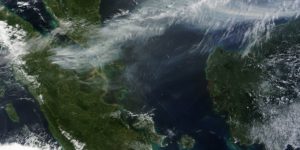
Nestlé, the world’s largest food and beverage company, is partnering with Airbus Defence and Space and The Forest Trust (FTF) to use its Starling Earth observation platform to monitor the entirety of its global supply chains for palm oil as part of the Swiss company’s commitment to reduce its global impact on deforestation.
The company has enacted an accelerated plan toward reaching its 2020 No Deforestation commitment by becoming the first global food company to implement the satellite-based Starling, which was developed by Airbus and TFT as a global verification system evidencing that no deforestation is taking place throughout the supply chain.
Starling uses cutting-edge technology combining high-resolution radar and optical satellite imagery to provide monitoring of land cover changes and forest cover disturbances. Data collected along with its analytics enable companies to manage risks and perform field intervention strategies.
“Starling is a fully digital service, offering best-in-class machine learning and cloud technologies to provide very precise and near-real time forest cover change information,” said François Lombard, Head of the Intelligence Business at Airbus Defence and Space. “Terabytes of satellite images are turned into actionable information, to provide our customers with a reliable service to monitor their supply chains and to early identify potential deforestation events.”
Starling utilizes Airbus’s high-resolution SPOT-6 and SPOT-7 satellites as well as third-party sensors, which are designed for large geographical areas. Its reference maps use detailed resolution to differentiate between production forests that include palm plantations, protected forests and other areas.
“We welcome Nestlé’s commitment to using Starling to monitor 100% of its palm oil supply chain,” said Bastien Sachet, CEO of TFT. “When we started our No Deforestation journey with Nestlé in 2010, no tools existed for them to effectively monitor their suppliers in this way and a solution had to be created. Now, we are pleased to say, there is a ready and able tool to help companies rid deforestation from their supply chains. We see this milestone as the next step in our journey with Nestlé.”
By 2017, 63% of Nestlé global supply chain was deforestation-free. Earlier this year, the company committed to achieve 100% RSPO certified sustainable palm oil by 2023. By December 2018, 100% of Nestlé’s palm oil supply chain, certified or not, will be monitored for deforestation using satellite imagery.
“In order to accelerate this journey, we have worked with Airbus and TFT since mid-2016 to embark on a pilot project over the Perak landscape in Malaysia.” said Magdi Batato, Executive Vice President, Head of Operations, Nestlé S.A. “Starling satellite monitoring is a game changer to achieve transparency in our supply chain and we are pleased to extend this collaboration to cover 100% of Nestlé’s global palm oil supply chains by the end of the year. We will also extend this program to cover our pulp and paper supply chains next year as well as soya at a later stage.”





